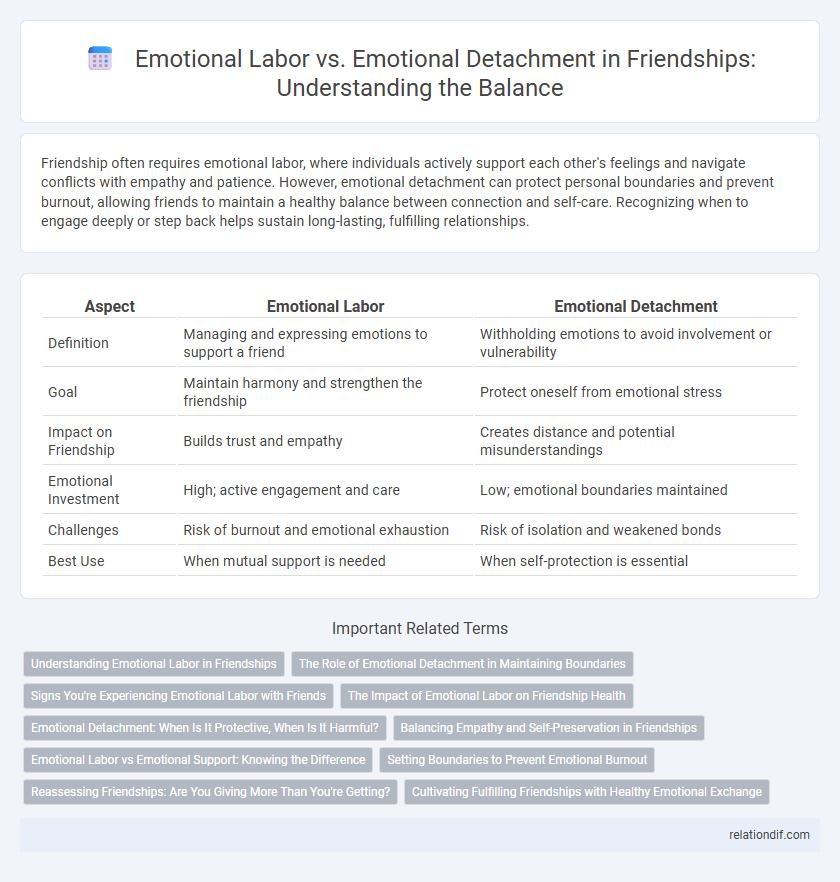Friendship often requires emotional labor, where individuals actively support each other's feelings and navigate conflicts with empathy and patience. However, emotional detachment can protect personal boundaries and prevent burnout, allowing friends to maintain a healthy balance between connection and self-care. Recognizing when to engage deeply or step back helps sustain long-lasting, fulfilling relationships.
Table of Comparison
| Aspect | Emotional Labor | Emotional Detachment |
|---|---|---|
| Definition | Managing and expressing emotions to support a friend | Withholding emotions to avoid involvement or vulnerability |
| Goal | Maintain harmony and strengthen the friendship | Protect oneself from emotional stress |
| Impact on Friendship | Builds trust and empathy | Creates distance and potential misunderstandings |
| Emotional Investment | High; active engagement and care | Low; emotional boundaries maintained |
| Challenges | Risk of burnout and emotional exhaustion | Risk of isolation and weakened bonds |
| Best Use | When mutual support is needed | When self-protection is essential |
Understanding Emotional Labor in Friendships
Emotional labor in friendships involves the effort invested in managing emotions, offering support, and fostering trust, which strengthens relational bonds over time. Emotional detachment, by contrast, creates distance and impedes genuine connection, often leading to misunderstandings or weakened friendships. Recognizing the balance between emotional labor and detachment is crucial for maintaining healthy, supportive friendships that promote mutual well-being and resilience.
The Role of Emotional Detachment in Maintaining Boundaries
Emotional detachment plays a critical role in maintaining healthy boundaries within friendships by allowing individuals to manage emotional labor without becoming overwhelmed or overly enmeshed. This balance helps preserve personal well-being and prevents burnout, ensuring that support remains sustainable over time. Setting clear limits through emotional detachment fosters mutual respect and prevents dependency, essential for long-term relational stability.
Signs You're Experiencing Emotional Labor with Friends
Feeling consistently drained after interactions, sensing a one-sided effort to maintain conversations, and frequently suppressing your own emotions to avoid conflict are clear signs of emotional labor in friendships. When you find yourself constantly managing not only your feelings but also those of your friends, it indicates an imbalance that may lead to emotional detachment as a coping mechanism. Recognizing these signs early helps preserve genuine connection and prevents burnout in maintaining healthy, supportive friendships.
The Impact of Emotional Labor on Friendship Health
Emotional labor in friendships involves managing and supporting a friend's feelings, which can strengthen bonds but also lead to emotional exhaustion if unbalanced. Persistent emotional labor without reciprocation may cause stress, resentment, and emotional detachment, damaging the overall health of the friendship. Maintaining clear boundaries and mutual empathy is essential to prevent burnout and preserve trust, intimacy, and long-term connection.
Emotional Detachment: When Is It Protective, When Is It Harmful?
Emotional detachment in friendship can serve as a protective mechanism when it prevents burnout from constant emotional labor, helping individuals maintain healthy boundaries and personal well-being. However, excessive detachment may harm relationships by fostering misunderstandings, reducing empathy, and weakening the trust essential for deep social connections. Balancing emotional engagement with self-care ensures that detachment protects mental health without compromising the emotional intimacy that sustains lasting friendships.
Balancing Empathy and Self-Preservation in Friendships
Balancing empathy and self-preservation in friendships requires managing emotional labor to maintain genuine connections without depleting mental energy. Setting boundaries helps prevent emotional exhaustion while fostering understanding and support between friends. Prioritizing self-care alongside empathetic listening ensures long-term relational health and mutual respect.
Emotional Labor vs Emotional Support: Knowing the Difference
Emotional labor in friendship involves the effort of managing and regulating one's own and others' emotions to maintain harmony, whereas emotional support refers to providing genuine empathy and comfort without self-sacrifice. Recognizing the difference helps prevent emotional exhaustion by setting healthy boundaries while still fostering meaningful connections. Balancing emotional labor and emotional support ensures sustainable friendships that nurture well-being for all parties involved.
Setting Boundaries to Prevent Emotional Burnout
Setting clear boundaries in friendships is essential to managing emotional labor and preventing emotional burnout. By openly communicating limits on time and emotional investment, individuals protect their mental well-being while maintaining meaningful connections. Prioritizing self-care through boundary-setting reduces the risk of emotional exhaustion and fosters healthier, more sustainable relationships.
Reassessing Friendships: Are You Giving More Than You're Getting?
Reassessing friendships involves recognizing the balance between emotional labor and emotional detachment, ensuring you are not consistently giving more support than you receive. Emotional labor in friendships requires empathy, active listening, and emotional investment, but disproportionate effort can lead to burnout and resentment. Prioritizing mutual care and setting healthy boundaries fosters relationships where emotional energy is reciprocated and valued.
Cultivating Fulfilling Friendships with Healthy Emotional Exchange
Cultivating fulfilling friendships requires balancing emotional labor with emotional detachment to ensure mutual support without self-exhaustion. Effective emotional exchange involves empathetic listening, genuine expression, and setting boundaries that protect personal well-being. Prioritizing this balance fosters trust, resilience, and deeper connections in long-term friendships.
emotional labor vs emotional detachment Infographic

 relationdif.com
relationdif.com